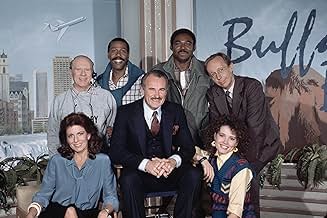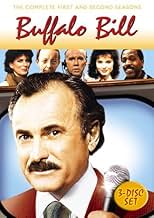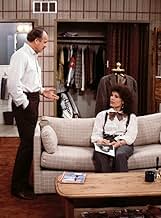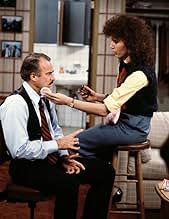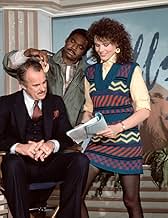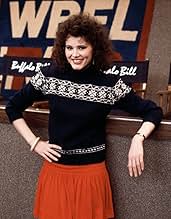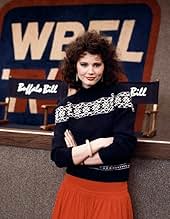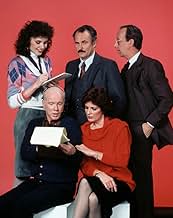Ajouter une intrigue dans votre langueEgotistical Buffalo TV host Bill Bittinger bullies crew and guests, driving station manager Karl Shub mad with lawsuits. Only director Jo Jo White stands up to Bill's tantrums as he fails to... Tout lireEgotistical Buffalo TV host Bill Bittinger bullies crew and guests, driving station manager Karl Shub mad with lawsuits. Only director Jo Jo White stands up to Bill's tantrums as he fails to break into bigger markets.Egotistical Buffalo TV host Bill Bittinger bullies crew and guests, driving station manager Karl Shub mad with lawsuits. Only director Jo Jo White stands up to Bill's tantrums as he fails to break into bigger markets.
- Nommé pour 11 Primetime Emmys
- 1 victoire et 14 nominations au total
Parcourir les épisodes
Avis à la une
Imagine that "The Dick Van Dyke Show" had centered on Carl Reiner's Alan Brady character and you will have a pretty good handle on Dabney Coleman's "Buffalo Bill" series.
Despite the many conspiracy theories there is little actual mystery regarding the early cancellation of Coleman's series; it simply failed to find an audience large enough to sustain it. Awards and critical acclaim won't take a show very far; especially back in the days when the three networks were pulling in the vast majority of television viewers.
If a quality show is a little different (insert "The Big Bang Theory" here) it will start slow and must show "steady" progress toward building a larger viewing audience. The progress only happens if it "holds" onto its initial group of viewers while adding new viewers each week that it is broadcast. Generally this only works if the show has figured out what it wants to be and consistently delivers a weekly product. Once firmly established a show has the luxury of an occasional clinker episode.
Unfortunately, "Buffalo Bill" was perhaps the most inconsistent series in the history of television. I hung with it throughout its entire broadcast run and was amazed by the wild swings from week-to-week. Episode 7 "Guess Who's Coming To Buffalo?" was an absolute gem, and several other episodes were equally inspired; but you never quite knew what you would get. Friends could be talked into one viewing. If it happened to be the right episode they would be hooked. If they saw a dog episode they would never watch again.
The cast was rarely the problem, although someone should have figured out that the best moments seemed to come when Dabney Coleman and Pippa Peartree were interacting as father and wayward daughter. These provided an amazing mix of comedy and poignancy; yet they were far too few. Contrast them with the much more frequent stuff involving Charles Robinson's Newdell, which was generally awkward and forced; both the writing and the execution. You don't have to look further than decisions like this to see that the producers had some serious "don't have a clue" moments.
The self-absorbed title character was often the source of the ratings-killing inconsistency. The humorous moments came from his exaggerated character flaws; imagine a self-promoting version of Sheldon Cooper. The "wheels fall off" moments were typically those showcasing his unlikely need for the approval of others; they could never quite settle on just who Bill was. The more his character wobbled between extremes of selfishness and vulnerability the harder it was take vicarious pleasure in his antics.
The uniqueness of the series was in its attempt to integrate comedy with serious subjects. Too often this crossed the line into overwrought melodrama. But when they got the balance right it worked as well as anything that has ever been on network television.
Then again, what do I know? I'm only a child.
Despite the many conspiracy theories there is little actual mystery regarding the early cancellation of Coleman's series; it simply failed to find an audience large enough to sustain it. Awards and critical acclaim won't take a show very far; especially back in the days when the three networks were pulling in the vast majority of television viewers.
If a quality show is a little different (insert "The Big Bang Theory" here) it will start slow and must show "steady" progress toward building a larger viewing audience. The progress only happens if it "holds" onto its initial group of viewers while adding new viewers each week that it is broadcast. Generally this only works if the show has figured out what it wants to be and consistently delivers a weekly product. Once firmly established a show has the luxury of an occasional clinker episode.
Unfortunately, "Buffalo Bill" was perhaps the most inconsistent series in the history of television. I hung with it throughout its entire broadcast run and was amazed by the wild swings from week-to-week. Episode 7 "Guess Who's Coming To Buffalo?" was an absolute gem, and several other episodes were equally inspired; but you never quite knew what you would get. Friends could be talked into one viewing. If it happened to be the right episode they would be hooked. If they saw a dog episode they would never watch again.
The cast was rarely the problem, although someone should have figured out that the best moments seemed to come when Dabney Coleman and Pippa Peartree were interacting as father and wayward daughter. These provided an amazing mix of comedy and poignancy; yet they were far too few. Contrast them with the much more frequent stuff involving Charles Robinson's Newdell, which was generally awkward and forced; both the writing and the execution. You don't have to look further than decisions like this to see that the producers had some serious "don't have a clue" moments.
The self-absorbed title character was often the source of the ratings-killing inconsistency. The humorous moments came from his exaggerated character flaws; imagine a self-promoting version of Sheldon Cooper. The "wheels fall off" moments were typically those showcasing his unlikely need for the approval of others; they could never quite settle on just who Bill was. The more his character wobbled between extremes of selfishness and vulnerability the harder it was take vicarious pleasure in his antics.
The uniqueness of the series was in its attempt to integrate comedy with serious subjects. Too often this crossed the line into overwrought melodrama. But when they got the balance right it worked as well as anything that has ever been on network television.
Then again, what do I know? I'm only a child.
A nasty, mean-spirited, and duplicitous lead character (Dabney Coleman) made for a comedy series that is always outrageous. And very, very funny.
When Dabney got too ornery, the series could always shift its focus to his co-star, Joanna Cassidy, cool on the surface, hot underneath.
Dabney's later series, "The Slap Maxwell Story", was the same idea, only his character had been defanged, and the venom removed for safety.
When Dabney got too ornery, the series could always shift its focus to his co-star, Joanna Cassidy, cool on the surface, hot underneath.
Dabney's later series, "The Slap Maxwell Story", was the same idea, only his character had been defanged, and the venom removed for safety.
BUFFALO BILL was originally received like a Neil LaBute or Todd Solondz movie; the few who liked this program LOVED it, while the masses who didn't like it LOATHED it.
There had been sitcoms starring essentially unlikable characters before, such as ALL IN THE FAMILY and FAWLTY TOWERS, but Archie Bunker and Basil Fawlty were veritable pussycats compared to Dabney Coleman's Bill Bittinger, host of a Buffalo, NY talk show. Think Coleman's "sexist, egotistical, lying, hypocritical bigot" of a boss in the movie 9 TO 5 and you pretty much have his BUFFALO BILL character, only here he's surrounded not by feisty secretaries but by wimps and sycophants. His stage manager Woody (John Fiedler) worships him, his research assistant Wendy (a young, nubile Geena Davis) is flustered around him while his director/longtime girlfriend Jo-Jo (Joanna Cassidy) puts up with him primarily out of self-loathing.
Brandon Tartikoff wrote in his memoirs that his greatest regret as NBC head was canceling BUFFALO BILL in 1984; one more season and it might have become a hit. Executive producer Bernie Brillstein went on to oversee THE LARRY SANDERS SHOW, and he's said he considers that successful HBO sitcom (also about an insecure talk show host) to have been the critical and ratings hit BUFFALO BILL should have been.
The series was created by the great comedy team of Tom (ALF) Patchett and Jay (MOLLY DODD) Tarses, who wrote the funniest episodes of THE BOB NEWHART SHOW in the 1970s. They bitterly broke up by the end of this show's run. I suspect that even if BUFFALO BILL had become a SEINFELD or FRIENDS-level hit, they'd have broken up anyway because the show was emotionally draining for an early-1980s sitcom. In one two-parter Jo-Jo, pregnant with Bill's baby, vindictively gets an abortion. In another episode, the racist Bill fires his black makeup man Newdell (Charlie Robinson), only to have a nightmare where he's chased by grotesque black stereotypes who lip sync to Ray Charles' "Hit the Road, Jack." Bill rehires Newdell and is congratulated on his enlightenment. In other words, WE GOT IT MADE or MAMA'S FAMILY this wasn't.
While BUFFALO BILL may not offer instant gratification, sticking through the entire run is worth it. Each member of the outstanding ensemble gets a moment to shine, the guest stars include Martin Landau and Jim Carrey (who impersonates Jerry Lewis) and the story lines are well-constructed with intelligent dialogue. In a stroke of good fortune, all 26 episodes were released in a no-frills three-disc DVD set in the fall of 2005 -- unfortunately, licensing issues prevented the "Hit the Road, Jack" sequence from making this set. Do yourself a favor and pick this up. There won't be another sitcom quite like BUFFALO BILL on network TV anytime soon.
There had been sitcoms starring essentially unlikable characters before, such as ALL IN THE FAMILY and FAWLTY TOWERS, but Archie Bunker and Basil Fawlty were veritable pussycats compared to Dabney Coleman's Bill Bittinger, host of a Buffalo, NY talk show. Think Coleman's "sexist, egotistical, lying, hypocritical bigot" of a boss in the movie 9 TO 5 and you pretty much have his BUFFALO BILL character, only here he's surrounded not by feisty secretaries but by wimps and sycophants. His stage manager Woody (John Fiedler) worships him, his research assistant Wendy (a young, nubile Geena Davis) is flustered around him while his director/longtime girlfriend Jo-Jo (Joanna Cassidy) puts up with him primarily out of self-loathing.
Brandon Tartikoff wrote in his memoirs that his greatest regret as NBC head was canceling BUFFALO BILL in 1984; one more season and it might have become a hit. Executive producer Bernie Brillstein went on to oversee THE LARRY SANDERS SHOW, and he's said he considers that successful HBO sitcom (also about an insecure talk show host) to have been the critical and ratings hit BUFFALO BILL should have been.
The series was created by the great comedy team of Tom (ALF) Patchett and Jay (MOLLY DODD) Tarses, who wrote the funniest episodes of THE BOB NEWHART SHOW in the 1970s. They bitterly broke up by the end of this show's run. I suspect that even if BUFFALO BILL had become a SEINFELD or FRIENDS-level hit, they'd have broken up anyway because the show was emotionally draining for an early-1980s sitcom. In one two-parter Jo-Jo, pregnant with Bill's baby, vindictively gets an abortion. In another episode, the racist Bill fires his black makeup man Newdell (Charlie Robinson), only to have a nightmare where he's chased by grotesque black stereotypes who lip sync to Ray Charles' "Hit the Road, Jack." Bill rehires Newdell and is congratulated on his enlightenment. In other words, WE GOT IT MADE or MAMA'S FAMILY this wasn't.
While BUFFALO BILL may not offer instant gratification, sticking through the entire run is worth it. Each member of the outstanding ensemble gets a moment to shine, the guest stars include Martin Landau and Jim Carrey (who impersonates Jerry Lewis) and the story lines are well-constructed with intelligent dialogue. In a stroke of good fortune, all 26 episodes were released in a no-frills three-disc DVD set in the fall of 2005 -- unfortunately, licensing issues prevented the "Hit the Road, Jack" sequence from making this set. Do yourself a favor and pick this up. There won't be another sitcom quite like BUFFALO BILL on network TV anytime soon.
Not ahead of it's time but firmly planted in the times. It gave us a nice look at the nastiness of the age. Hilarious. Probably one of the top three comedies to hit the airwaves. I have a distinct memory of laughing so hard that I fell off the couch. I have tried by hook or crook to get copies. I also think it's cancellation represents the true death of the soul of this country. The country had decided that it could not tolerate smart people writing for television. I don't know what it's numbers were but with a show of this quality it's bad business to not give it time to at least develop an audience. So, what's new another tragedy perpetuated by the Network idiots.
Long before "Larry Sanders", this series took a look at what goes on during and behind the scenes at a talk show. This is Dabney Coleman at his best. His portrayal of the philanderer Bill Bittinger is brilliant. And Joanna Cassidy is wonderful as JoJo, his on-again, off-again romantic interest. After all these years, I still consider this to be one of the funniest shows I've ever seen. It's a shame that few people have seen it.
Le saviez-vous
- AnecdotesBrandon Tartikoff (NBC President at the time) mentioned in his memoirs that canceling the show was the biggest professional regret of his career.
- ConnexionsFeatured in The 35th Annual Primetime Emmy Awards (1983)
Meilleurs choix
Connectez-vous pour évaluer et suivre la liste de favoris afin de recevoir des recommandations personnalisées
- How many seasons does Buffalo Bill have?Alimenté par Alexa
Détails
Contribuer à cette page
Suggérer une modification ou ajouter du contenu manquant

Lacune principale
By what name was Buffalo Bill (1983) officially released in India in English?
Répondre
